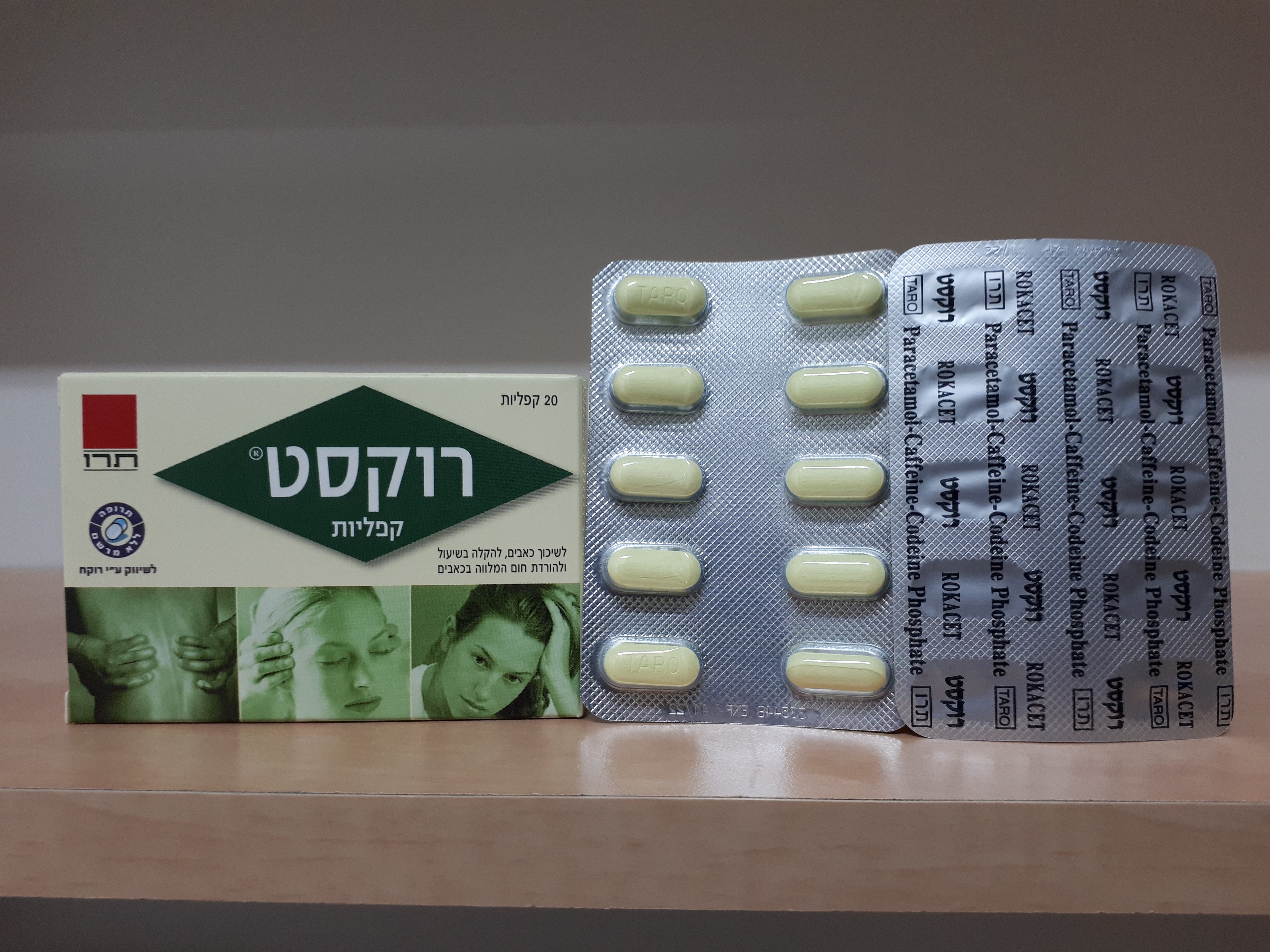Quest for the right Drug

רוקסט ROKACET (CAFFEINE, CODEINE PHOSPHATE, PARACETAMOL)
תרופה במרשם
תרופה בסל
נרקוטיקה
ציטוטוקסיקה
צורת מתן:
פומי : PER OS
צורת מינון:
קפליות : CAPLETS
עלון לרופא
מינוניםPosology התוויות
Indications תופעות לוואי
Adverse reactions התוויות נגד
Contraindications אינטראקציות
Interactions מינון יתר
Overdose הריון/הנקה
Pregnancy & Lactation אוכלוסיות מיוחדות
Special populations תכונות פרמקולוגיות
Pharmacological properties מידע רוקחי
Pharmaceutical particulars אזהרת שימוש
Special Warning עלון לרופא
Physicians Leaflet
Pharmacological properties : תכונות פרמקולוגיות
Pharmacodynamic Properties
5.1 Pharmacodynamic properties Pharmacotherapeutic group: Opioids in combination with non-opioid analgesics: codeine and paracetamol. ATC code: N02AJ09 Paracetamol is a well-established analgesic and antipyretic. Its mechanism of action is believed to include inhibition of prostaglandin synthesis, primarily within the central nervous system. The lack of peripheral prostaglandin inhibition confers important pharmacological properties such as the maintenance of the protective prostaglandins within the gastrointestinal tract. Caffeine has a stimulating effect on the central nervous system and possesses a weak diuretic action. Caffeine stimulates all levels of the CNS, although its cortical effects are milder and shorter than those of amphetamines. Analgesia adjunct: caffeine constricts cerebral vasculature with an accompanying decrease in the cerebral blood flow and in the oxygen tension of the brain. It is believed that caffeine helps to relieve headache by providing more rapid onset of action and/or enhancing pain relief with lower doses of analgesic. Recent studies with ergotamine indicate that the enhancement of effect by addition of caffeine may also be due to improved gastrointestinal absorption of ergotamine when administered with caffeine. Caffeine enhances and prolongs the analgesic activity of paracetamol up to 3 hours. Codeine is a centrally acting weak analgesic. Codeine exerts its effect through µ opioid receptors, although codeine has low affinity for these receptors, and its analgesic effect is due to its conversion to morphine. Codeine, particularly in combination with other analgesics such as paracetamol, has been shown to be effective in acute nociceptive pain.
Pharmacokinetic Properties
5.2 Pharmacokinetic properties Absorption Paracetamol is rapidly and almost completely absorbed from the gastrointestinal tract. After oral administration, concentration of paracetamol in plasma reaches a peak in 10-60 minutes depending on pharmaceutical form. Caffeine is rapidly but irregularly absorbed after oral administration; absorption is pH related. Maximum plasma concentrations are achieved within one hour and the plasma half-life is about 4.9 hours, but there are large inter-individual and intra- individual differences ranging between 1.9-12.2 hours. Codeine phosphate is well absorbed from the gastrointestinal tract after oral administration with peak plasma concentration being reached in approximately 1 hour after ingestion. Distribution Paracetamol is relatively uniformly distributed throughout most body fluids and exhibits variable protein binding. Caffeine administered orally is practically fully bioavailable and distributes into all body fluids. The mean plasma protein binding of caffeine is 35%. Maximum plasma concentrations are reached after 30-40 minutes. Codeine distributes widely throughout the body and exhibits low plasma protein binding with a plasma half-life of approximately 2.5 to 3 hours. Biotransformation Paracetamol is mainly metabolised in the liver, following two major metabolic pathways, with formation of glucuronic acid and sulfuric acid conjugates. The latter route is rapidly saturated at doses higher than the therapeutic dosages. A minor route, catalysed by the Cytochrome P 450 (mostly CYP2E1), results in the formation of an intermediate reagent (N-acetyl-p-benzoquinone imine) which under normal conditions of use, is rapidly detoxified by glutathione and eliminated in the urine, after conjugation with cysteine and mercapturic acid. Conversely, when massive intoxication occurs, the quantity of this toxic metabolite is increased. Caffeine is almost completely metabolised in the liver by oxidation, demethylation and acetylation, and is excreted in the urine. The major metabolites are 1- methylxantine, 7-methylxantine, 1,7-dimethylxantine (paraxantine). Minor metabolites include 1-methyluric acid and 5-acetylamino-6-formylamino 3- methyluracil (AMFU). Codeine is metabolised in the liver by the hepatic enzyme Cytochrome P450 2D6 (CYP2D6) to form morphine, and Cytochrome (CYP3A4) to form norcodeine, which are further metabolised by conjugation with glucuronic acid. Elimination Less than 5% is excreted as unmodified paracetamol; the elimination half-life varies from 1 to 4 hours. Elimination is essentially through the urine. 90% of the ingested dose is eliminated via the kidneys within 24 hours, principally as glucuronide (60- 80%) and sulfate conjugates (20-30%). In cases of renal failure (GFR≤50ml/min), the elimination of paracetamol is slightly delayed, the elimination half-life ranging from 2 to 5.3 hours. For the glucuronide and sulfate conjugates, the elimination rate is 3 times slower in subjects with severe renal impairment than in healthy subjects. and the plasma half-life is 1-4 hours. Excretion is almost exclusively renal, in the form of conjugated metabolites. Caffeine and its metabolites are primarily eliminated by the kidneys. Plasma half- life = 4-10 hours. In 48 hours, 45% of a dose is excreted in the urine as l-methylxanthine and l-methyluric acid. 85% of an oral dose of codeine is excreted in the urine within 24 hours, 40-70% of this being free or conjugated codeine, 5-15% free or conjugated morphine, 10-20% free or conjugated norcodeine, and trace amounts may be free or conjugated normorphine.

שימוש לפי פנקס קופ''ח כללית 1994
לא צוין
תאריך הכללה מקורי בסל
01/01/1995
הגבלות
תרופה שאושרה לשימוש כללי בקופ'ח
מידע נוסף
עלון מידע לצרכן
11.07.21 - עלון לצרכן אנגלית 11.07.21 - עלון לצרכן עברית 11.07.21 - עלון לצרכן ערבית 11.10.22 - עלון לצרכן אנגלית 11.10.22 - עלון לצרכן עברית 11.10.22 - עלון לצרכן ערבית 29.08.23 - עלון לצרכן אנגלית 29.08.23 - עלון לצרכן עברית 29.08.23 - עלון לצרכן ערבית 29.11.23 - עלון לצרכן עברית 29.11.23 - עלון לצרכן ערבית 04.12.23 - עלון לצרכן אנגלית 26.01.24 - עלון לצרכן אנגלית 18.04.21 - החמרה לעלון 11.07.21 - החמרה לעלון 07.08.13 - החמרה לעלון 12.09.13 - החמרה לעלון 06.06.19 - החמרה לעלון 11.10.22 - החמרה לעלון 30.08.23 - החמרה לעלון 29.11.23 - החמרה לעלוןלתרופה במאגר משרד הבריאות
רוקסט